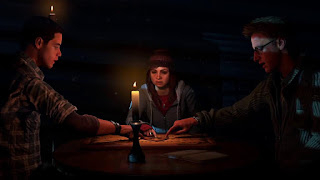The film opens with Emily Blunt's character Kate Mercer performing a ram-raid on a known property with ties to the Mexican cartel. Things don't quite end up as expected, however, and she begins to see with blinding clarity that kicking in doors won't reach the guys on the top. So, when her actions are noticed by government higher-ups, she's enlisted to join a specialist task force that give her the assurance they'll get a chance at "the real guys behind this". After a particularly bloody trip to Juárez, Kate begins to see that maybe the people she's with aren't necessarily the good guys, and that she might be entering a world which she's far from familiar with.
The first thing you'll notice about this unexpectedly brilliant movie is how beautiful it looks. Yes: rotting corpses hidden in walls might not be a pretty sight, but you'd be forgiven for thinking so when it's delivered in such a stylised and enthralling way. There are a few shots in particular that manage to tell far more than pages of dialogue ever could, and they're intensely impressive to even the most passive of viewers. A single frame is never wasted in Sicario, and that's precisely how it should be.
But, as I mentioned, the acting is just as sharp. Emily Blunt in the lead role is a perfect fit, as she manages to portray exactly what the viewer is feeling; we don't honestly know who these people are, or if they're even within the law, and neither does she. The absolute star of the show has to be Benicio Del Toro as the sinister and enigmatic Alejandro, however. From the very first time we see him, Del Toro leaves you full of questions that might not even get resolved. Not only does he add to the disconcertingly mysterious tone of the entire movie, but his guarded motives are one of the things that keep you watching so intently. Josh Brolin also delivers a strong performance as Kate's polar opposite with the character of Matt Graver; a gung-ho fighter who never fails to see the funny side amongst the mangled corpses.
 |
| Kate (Emily Blunt) |
If you're going in to Sicario for an out-an-out popcorn flick, then you're better off looking elsewhere. This is heavy content, and it's delivered in a style that perfectly suits just that; violence is visceral and destructive, not glamorous. If you think you can stomach it, though, then it's well worth your time.




























